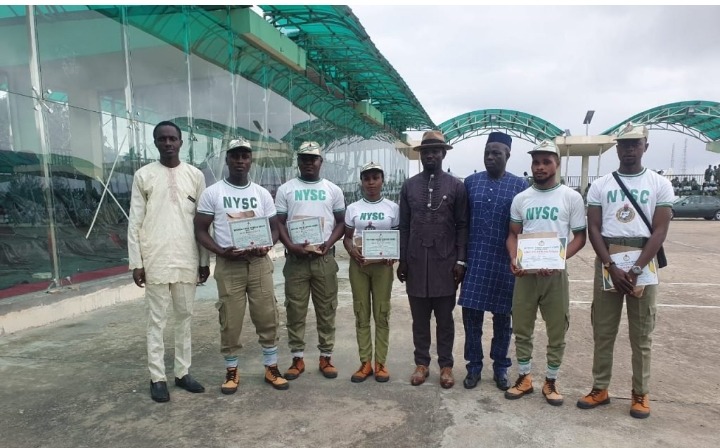News
Bayelsa Govt Rewards Outstanding Corps Members With Cash, Certificates

The Bayelsa State Government has honoured five corps members who distinguished themselves during the 2021 Batch B (Stream I and II) Service Year.
To appreciate their outstanding performance, the corps members were presented with an award certificate personally signed by the Governor of Bayelsa State, Senator Douye Diri and a cash reward of N250,000 to each of the State Honours Awardees and N200,000 for the Chairman’s Honours Awardees respectively.
Corps member Nkwocha Chukwuemeka Callistus BY/21B/2536 emerged overall best in the State honours category, while two others Olufemi Ebenezer, BY/21B/0649 and Chukwuma Sandra Chinwendu BY/21B/0913 came second and third respectively.
Corps member Obeta Christian Chukwuebuka BY/12B/0412 and Ogban Peter Obong BY/21B/0121 scooped the Chairman’s Honours Award.
The honorees were adjudged to have performed very well during the Orientation Course, Primary Assignment and Community Development Services.
Speaking during the low-key passing out programme for the 2021 Batch B Stream II corps members held in Yenagoa on Thursday, the Governor of Bayelsa State, who was represented by his Executive Assistant on NYSC Matters, Wisdom Richard Poyeri commended the awardees for their selfless contributions to the development of the state.
Governor Diri particularly commended them for going the extra mile to add value to their host communities, noting that his government will continue to recognize and appreciate outstanding corps members.
The State Chief Executive congratulated the 2021 Batch Stream II corps members for a successful year and urged them to continue to be patriotic to the nation even as they exit the national service, noting that all the corps members are winners because they gave their best in the service to the state.
READ ALSO: Insecurity: NYSC DG Charges Corps Members On Personal Security
Governor Diri further urged the outgoing corps members to be good ambassadors of the state and not to lose faith in Nigeria.
The State Coordinator, Mr Mohammed Adamu Jiya who was represented by the Assistant Director, Deployment and Relocation, Mr. Rotimi Abiodun thanked the governor for the tremendous support to the scheme and for taking the welfare and security of corps members as a top priority.
Mr. Jiya urged serving corps members in the state to emulate the honorees and wished the outgoing corps members a rewarding post-service life.
The corps member of the year, Nkwocha Chukwuemeka Callistus, a first-class graduate of Biochemistry from the Michael Okpara University of Agriculture, Umudike carried out his primary assignment at the Niger Delta University, Amassoma in Southern Ijaw Local Government Area.
Among his achievements are, securing a five-room accommodation and thirty mattresses for corps members who are posted to the Niger Delta University, renovation of an abandoned six-room staff quarters in Alomu Central School, Amassoma, and procurement of 10 pillows for Amassoma General Hospital among other achievements.
News
Edo SWAN Distances Self From Online Publication Against Enabulele

…demands retraction, warns member against unverified publication
The Sports Writers Association of Nigeria (SWAN), Edo State Chapter, has distanced itself from an online publication titled: ‘Samuel Ogbemudia Stadium Shut Against Stephen Keshi.’
A statement signed by the Secretary of the association, Comrade Idahosa Moses, Edo SWAN said neither was it consulted nor involved in the “framing of the narrative presented by the online publication.”
Edo SWAN described the publication as misleading, sensational and grossly lacking in factual balance.
The statement partly reads: “SWAN finds the report inconsistent with the ethical standards and core values of the journalism profession.
READ ALSO:SWAN Orders Nationwide Boycott Of NFF Activities
“While Edo SWAN recognises and respects the sentiments expressed by Mr. Austin Popo, Secretary of the Board of Trustees of the Stephen Keshi Football and Vocational Training Centre (SKFTVC), concerning the challenges encountered in securing the use of the Samuel Ogbemudia Stadium for this year’s Stephen Keshi Memorial National Under-17 Soccer Tournament, it is imperative to state that such concerns should not be reported in a manner that imputes motives, assigns blame without verification, or portrays public officials as acting in bad faith.”
On allegations against the Executive Chairman of the Edo State Sports Commission, Hon. Amadin Desmond Enabulele, in the publication, SWAN described Enabulele as a “seasoned professional with a proven track record of integrity and dedicated service to sports development in Edo State.”
“Any insinuation that he or the Commission deliberately acted to undermine the memory and legacy of the late Stephen Okechukwu Keshi is not only unfair but also unsupported by verifiable facts.”
Edo SWAN, therefore, “strongly cautions the publisher of Popular News to desist from publishing unverified and inflammatory reports capable of misleading the public and damaging reputations.”
READ ALSO:Botswana’s New President Sworn In As Voters Kick Out Ruling Party Of Nearly Six Decades
“The Association formally demands that the controversial publication be withdrawn immediately and that an unreserved apology be tendered to Hon. Amadin Desmond Enabulele.”
SWAN further “extends its sincere apologies to the Chairman of the Edo State Sports Commission, who is also a Patron of the Edo SWAN Chapter, for any embarrassment or misrepresentation arising from the said publication, and assures him of its continued respect, support and cooperation.”
Edo SWAN, while stating that it “shares in the collective responsibility of preserving and honouring the legacy of the late Stephen Keshi—a national icon whose contributions to Nigerian football remain indelible—the Association, maintained that “this noble course must be pursued through constructive engagement, professionalism and mutual respect among all stakeholders.”
Edo SWAN, thereafter, warned “all sports writers in the state to avoid unverifiable reports and sensationalism, stressing that any member found culpable of professional misconduct will be decisively sanctioned in line with the Association’s statutes.”
News
Court Dissolves Petitioner’s Marriage Over Lack Of Love, Care

An Area Court sitting at Centre-Igboro, Ilorin in Kwara State, on Thursday, dissolved the four-year-old marriage between Aminat Mustapha and Wahab Adeshina, following the petitioner’s insistence.
The petitioner told the court that she was no longer interested in her marriage to her husband following claims of lack of love and care.
According to the News Agency of Nigeria (NAN), while delivering ruling, the presiding judge, Mr Toyin Aluko, held that the respondent had written to the court, accepting the divorce application made by his wife.
READ ALSO:Why I Charged My Husband Money For Sex —Woman
Aluko, consequently, dissolved the marriage between the parties, and ordered the woman to observe one month iddah (waiting period) before she could remarry.
Meanwhile, the court granted custody of the two children in the marriage, ages one and three, to their mother.
He ordered the father to pay a monthly sum of N20,000 for the children’s feeding and maintenance.
The court also held that the respondent will be responsible for their education and healthcare.
Again, the court held that the father has unrestricted access to his children, but at reasonable time adding that he should be notified before any decision is taken on his children.
The judge ordered the petitioner to get a copy of the judgment and send same to the respondent.
News
Tinubu Embarks On Three-state Visit

President Bola Ahmed Tinubu will depart Abuja on Saturday on a working visit to Borno, Bauchi and Lagos.
This is contained in a statement issued by Presidential Spokesperson, Mr Bayo Onanuga, on Friday in Abuja.
While in Borno, the President will commission projects executed by the Borno State Government under Gov. Babagana Zulum, in collaboration with the Federal Government.
He will also attend the wedding ceremony of Sadeeq Sheriff, son of former Borno Governor, Sen. Ali Modu Sheriff, and his bride, Hadiza Kam Salem.
READ ALSO:Ambassadorial Nominees: Ndume Asks Tinubu To Withdraw List
From Maiduguri, Tinubu will proceed to Bauchi State to condole with the state government and the family of Sheikh Dahiru Bauchi, the renowned Islamic cleric and leader of the Tijjaniyya Muslim Brotherhood.
Sheikh Dahiru Bauchi died on Nov. 27.
After the condolence visit, the President will travel to Lagos, where he will spend the end-of-year holidays.
During his stay in Lagos, Tinubu is expected to attend several engagements, including the Eyo Festival scheduled for Dec. 27.
The festival, to be held at Tafawa Balewa Square, will honour notable personalities, including the President’s late mother, Alhaja Abibatu Mogaji, former Lagos State governors Alhaji Lateef Jakande and Chief Michael Otedola.

 Metro4 days ago
Metro4 days agoAlleged Organ Harvesting: Bereaved Families Rush To Check Corpses

 News4 days ago
News4 days agoForest Reserve: Okpebholo Broker Peace Between Host Communities, Investors

 News3 days ago
News3 days agoPolice Confirm Edo Tanker Explosion, say No Casualty

 News2 days ago
News2 days agoFormer Delta North senator Peter Nwaoboshi Dies

 Metro1 day ago
Metro1 day agoJUST IN: Former Edo Information Commissioner Is Dead

 News4 days ago
News4 days agoEdo SSG Calls On Media To Support Govt Policies, Assures Better Welfare

 News3 days ago
News3 days agoGrassroots To Global Podium: Edo Sports Commission Marks Enabulele’s First Year In Office

 News3 days ago
News3 days agoOtuaro Tasks Media On Objective Reportage

 News3 days ago
News3 days agoIPF Hosts Media Conference, Seeks Protection For N’Delta Environment

 News3 days ago
News3 days agoOkpebholo Sympathises With Otaru, People of Auchi Over Tragic Tanker Fire Incident






























